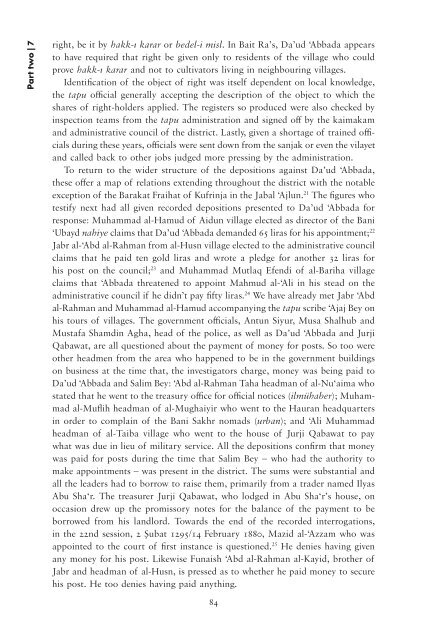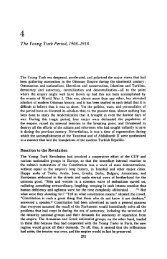Governing property, making the modern state - PSI424
Governing property, making the modern state - PSI424
Governing property, making the modern state - PSI424
Create successful ePaper yourself
Turn your PDF publications into a flip-book with our unique Google optimized e-Paper software.
Part two | 7<br />
right, be it by hakk-ı karar or bedel-i misl. In Bait Ra’s, Da’ud ‘Abbada appears<br />
to have required that right be given only to residents of <strong>the</strong> village who could<br />
prove hakk-ı karar and not to cultivators living in neighbouring villages.<br />
Identification of <strong>the</strong> object of right was itself dependent on local knowledge,<br />
<strong>the</strong> tapu official generally accepting <strong>the</strong> description of <strong>the</strong> object to which <strong>the</strong><br />
shares of right-holders applied. The registers so produced were also checked by<br />
inspection teams from <strong>the</strong> tapu administration and signed off by <strong>the</strong> kaimakam<br />
and administrative council of <strong>the</strong> district. Lastly, given a shortage of trained officials<br />
during <strong>the</strong>se years, officials were sent down from <strong>the</strong> sanjak or even <strong>the</strong> vilayet<br />
and called back to o<strong>the</strong>r jobs judged more pressing by <strong>the</strong> administration.<br />
To return to <strong>the</strong> wider structure of <strong>the</strong> depositions against Da’ud ‘Abbada,<br />
<strong>the</strong>se offer a map of relations extending throughout <strong>the</strong> district with <strong>the</strong> notable<br />
exception of <strong>the</strong> Barakat Fraihat of Kufrinja in <strong>the</strong> Jabal ‘Ajlun. 21 The figures who<br />
testify next had all given recorded depositions presented to Da’ud ‘Abbada for<br />
response: Muhammad al-Hamud of Aidun village elected as director of <strong>the</strong> Bani<br />
‘Ubayd nahiye claims that Da’ud ‘Abbada demanded 65 liras for his appointment; 22<br />
Jabr al-‘Abd al-Rahman from al-Husn village elected to <strong>the</strong> administrative council<br />
claims that he paid ten gold liras and wrote a pledge for ano<strong>the</strong>r 32 liras for<br />
his post on <strong>the</strong> council; 23 and Muhammad Mutlaq Efendi of al-Bariha village<br />
claims that ‘Abbada threatened to appoint Mahmud al-‘Ali in his stead on <strong>the</strong><br />
administrative council if he didn’t pay fifty liras. 24 We have already met Jabr ‘Abd<br />
al-Rahman and Muhammad al-Hamud accompanying <strong>the</strong> tapu scribe ‘Ajaj Bey on<br />
his tours of villages. The government officials, Antun Siyur, Musa Shalhub and<br />
Mustafa Shamdin Agha, head of <strong>the</strong> police, as well as Da’ud ‘Abbada and Jurji<br />
Qabawat, are all questioned about <strong>the</strong> payment of money for posts. So too were<br />
o<strong>the</strong>r headmen from <strong>the</strong> area who happened to be in <strong>the</strong> government buildings<br />
on business at <strong>the</strong> time that, <strong>the</strong> investigators charge, money was being paid to<br />
Da’ud ‘Abbada and Salim Bey: ‘Abd al-Rahman Taha headman of al-Nu‘aima who<br />
<strong>state</strong>d that he went to <strong>the</strong> treasury office for official notices (ilmühaber); Muhammad<br />
al-Muflih headman of al-Mughaiyir who went to <strong>the</strong> Hauran headquarters<br />
in order to complain of <strong>the</strong> Bani Sakhr nomads (urban); and ‘Ali Muhammad<br />
headman of al-Taiba village who went to <strong>the</strong> house of Jurji Qabawat to pay<br />
what was due in lieu of military service. All <strong>the</strong> depositions confirm that money<br />
was paid for posts during <strong>the</strong> time that Salim Bey – who had <strong>the</strong> authority to<br />
make appointments – was present in <strong>the</strong> district. The sums were substantial and<br />
all <strong>the</strong> leaders had to borrow to raise <strong>the</strong>m, primarily from a trader named Ilyas<br />
Abu Sha‘r. The treasurer Jurji Qabawat, who lodged in Abu Sha‘r’s house, on<br />
occasion drew up <strong>the</strong> promissory notes for <strong>the</strong> balance of <strong>the</strong> payment to be<br />
borrowed from his landlord. Towards <strong>the</strong> end of <strong>the</strong> recorded interrogations,<br />
in <strong>the</strong> 22nd session, 2 Şubat 1295/14 February 1880, Mazid al-‘Azzam who was<br />
appointed to <strong>the</strong> court of first instance is questioned. 25 He denies having given<br />
any money for his post. Likewise Funaish ‘Abd al-Rahman al-Kayid, bro<strong>the</strong>r of<br />
Jabr and headman of al-Husn, is pressed as to whe<strong>the</strong>r he paid money to secure<br />
his post. He too denies having paid anything.<br />
84












